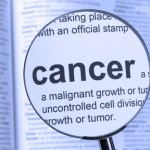Simple Bad Luck – Cause For Many Cancers – Say Researchers
Sometimes there just isn’t a good explanation for a cancer diagnosis other than random bad luck.
That’s what researchers at Johns Hopkins have found. In a study published Thursday in the journal Science, oncologist Dr. Bert Vogelstein and biomathematician Cristian Tomasetti link more cancers than previously thought to random DNA mutations, and not to heredity or environmental factors.
Their analysis reveals a strong correlation between the total number of divisions that naturally occur in a tissue over its lifetime and the risk of getting cancer in this tissue. So, the greater number of divisions, the higher the risk of developing cancer in that tissue.
The two looked at rates of cell division among 31 types of tissue. They found that 22 of the types, including pancreatic, bone, ovarian and brain cancer, are largely affected by these random divisions. The other nine, including colorectal, skin and smoking-related lung cancer, were more affected by genetics and environmental factors.
But the researchers warn that this new analysis does not mean that people should ignore other factors that could contribute developing cancer. Tomasetti said, for instance, it is well known that smoking carries a huge risk for tissues like lung cancer, so it depends on the tissue.
The pair did not look at breast cancer and prostate cancer, because there are not reliable estimates for the rates of those tissues’ cell divisions.
To learn more about this study, we talked to co-author Cristian Tomasetti.
NEWSHOUR: Cristian Tomasetti, thank you for joining us. So what’s new here?
CRISTIAN TOMASETTI: We know that cancer is due to three main factors: the environment — things like smoking, environmental factors; those that are genetically inherited; and then the third factor is just pure chance. And the pure chance is due to our cells and our tissues that divide and some tissues divide very frequently. And every time you have a division, there is a small probability that a mutation occurs in our DNA. And if it happens in the wrong gene, this may take us to cancer. So what this study did, we analyzed what is the role of bad luck, basically, among all the components. And it turns out that it plays a key role. It’s responsible for what we estimate to be two-thirds of the variation of cancer risk across tissues in humans.
NEWSHOUR: Why did you decide to exclude breast cancer and prostate cancer?
CRISTIAN TOMASETTI: We studied 31 tissue types. And what you asked is very important because breast cancer and prostate cancer — those are two very, very important cancers with extremely high incidence. The reason why we had to leave them out is that we didn’t feel that we had reliable enough estimates for how many stem cell divisions occur in those tissues in a lifetime. And to simply explain the basic idea, tissues like colon undergo divisions that say renew every five days or basically a week. So there is very high renewal, and it’s pretty linear in time. While in tissues like breast, the renewal, the cell division, it’s highly dependent on our hormonal levels and age, so we were not able to find estimates that we felt were reliable enough to give us a number that would have allowed us to do an analysis for those tissues.
Category: Articles





































